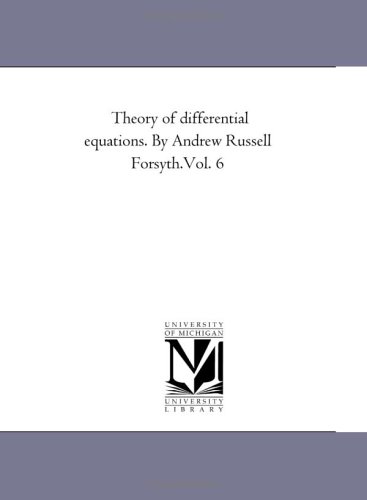

Most ebook files are in PDF format, so you can easily read them using various software such as Foxit Reader or directly on the Google Chrome browser.
Some ebook files are released by publishers in other formats such as .awz, .mobi, .epub, .fb2, etc. You may need to install specific software to read these formats on mobile/PC, such as Calibre.
Please read the tutorial at this link: https://ebookbell.com/faq
We offer FREE conversion to the popular formats you request; however, this may take some time. Therefore, right after payment, please email us, and we will try to provide the service as quickly as possible.
For some exceptional file formats or broken links (if any), please refrain from opening any disputes. Instead, email us first, and we will try to assist within a maximum of 6 hours.
EbookBell Team

0.0
0 reviews

ISBN 10: 1334017948
ISBN 13: 978-1334017940
Author: Andrew Russell Forsyth
Andrew Russell Forsyth (1858–1942) was an influential Scottish mathematician notable for incorporating the advances of Continental mathematics within the British tradition. Originally published in 1906, this book constitutes the sixth and final volume in Forsyth's Theory of Differential Equations series, concentrating specifically on partial differential equations. The text contains detailed information on the development of this area and substantial contributions made to it. All sources are quoted in their proper connection and a few fresh investigations are added. Examples are given, where necessary, in order to provide illustrations of various methods. This book will be of value to anyone with an interest in differential equations and the history of mathematics.
12. General integrals of equations of orders higher than the first
13. Linear equations of the second order in two independent variables: the Laplace-transformations
14. Adjoint equations: linear equations having equal invariants
15. Forms of equations of the second order in two independent variables having their general integrals in explicit finite form
16. Equations of the second order in two independent variables having an intermediate integral
17. Ampère's method applied to equations of the second order in two independent variables
18. Darboux's method and other methods for equations of the second order in two independent variables
19. Generalisation of integrals
20. Characteristics of equations of second order: intermediate integrals
21. General transformation of equations of the second order
22. Equations of the third and higher orders, in two independent variables
23. Equations of the second order in more than two independent variables, having an intermediate integral
24. Equations of the second order in three independent variables, not necessarily having an intermediate integral
Index to Part IV.
theory of differential equations
electronic journal of qualitative theory of differential equations
qualitative theory of differential equations
stability theory of differential equations
arnold geometric theory of differential equations
Tags: Andrew Russell Forsyth, Theory, Differential, Equations, Partial